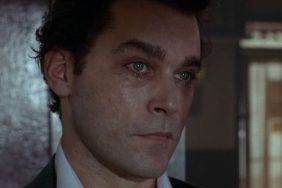Jason Statham isn’t just a man, he’s also a fist. Over the last two decades he has emerged as one of cinema’s reigning badasses, an old school action hero who doesn’t always make good movies, but always delivers what is asked of him. Usually it’s the fist. Sometimes it’s a sense of humor. Always, it’s the goods.
With his new film, Mechanic: Resurrection, in theaters this weekend, we figured the time had finally come to give the actor his due, and ask our panel of critics “What’s the best Jason Statham movie ever?” And while it should come as no surprise that they each picked a different movie, it should come as no surprise whatsoever that all of their picks are awesome.
Find out what Crave’s William Bibbiani and Witney Seibold, and Collider’s Brian Formo picked, and come back next week for an all-new, highly debatable installment of Crave’s The Best Movie Ever!
Witney Seibold’s Pick: The Transporter (2002)

20th Century Fox
Jason Statham is adept at playing only one role: That of Jason Statham. His fireplug physique, permanent scowl, and gravely voice don’t make for a great range of actorly diversity, so he is typically cast as himself. He may be a good guy, he may be a bad guy, but he’s always a tough guy. Unlike contemporaries like Vin Diesel, Jason Statham cannot play broad, friendly, family comedies. He was, is, and ever shall be Jason Statham. I think filmmakers should perhaps just dispense with giving his characters names, and re-name them all “Jason Statham” to keep matters clear.
Statham is also, perhaps, the last remaining cinematic “badass” that we have. Throughout the 1980s and into the 1990s, the tone of most action films were dictated not by the premise, the screenplay, nor the director, but by the charisma and legend of the central star. Schwarzenegger dominated his films more than his directors did, for instance. Statham is the same way. The directors dictate the tone, but Statham guarantees the content.
The archetypal Statham performance comes from 2002 Besson-produced film The Transporter, wherein our bald bull played an all-business driver-for-hire named Frank who lives by a strict code rules, who never breaks said own rules, and who takes money without thoughts of morality. Of course, the time he breaks a rule, he gets into hot water. The Transporter depicts Statham in a way, I think, we always assumed he naturally lived: Rich, tough, implacably level-headed, and able to knock people out by staring at them. He is skilled and cool at all times. He is never wounded or vulnerable. Frank merely is who he is. And that can be immensely appealing.
William Bibbiani’s Pick: Transporter 2 (2005)

20th Century Fox
Death, taxes, and Jason Statham: the three things you can always rely on. And while his films aren’t all created equal (many, like Parker and Crank: High Voltage, stink right out loud), he’s always fully committed to his steely-eyed persona. He’s a smooth-skinned muscle mass with a dry sense of humor and remarkably limber limbs. Witney is right, he’s the last of the old-school badasses, so his best movie should be the most badass movie he’s ever starred in. And I love that it’s also the one in which he’s gay.
To be fair, director Louis Leterrier, who also ghost directed the first Transporter, always intended Frank Martin to be gay. It’s just that in Transporter 2 the subtext shoots out of the screen like that killer from Saboteur. This time, Frank is playing chauffeur to a politician’s family, befriending their young child and fighting off the sexual advances of the sexy matriarch (“because of who I am,” he says). When the child is kidnapped, Frank gets blamed, and he proceeds to zoom around Miami in his supercharged car, flipping it in mid-air to scrape bombs off the bottom and at least once riding a jet ski on the freakin’ pavement.
It’s an enormously ludicrous film but you’d never know it from Jason Statham’s performance. He is thoroughly committed to his serious action hero persona, and although it’s unclear whether he was fully aware of Transporter 2‘s gay subtext, the fact that he never winks to the camera about it makes the film seem that much more progressive. He just happens to be a badass, and he just happens to be gay. It shouldn’t be revolutionary but that’s how it comes across. And the film would have been an amazing, stunt-filled, absolutely ridiculous Commando-esque action movie accomplishment either way.
Brian Formo’s Pick: Spy (2015)

20th Century Fox
The appeal of Jason Statham is that while he’s a familiar 90s action hero in terms of punches, kicks, problem solving skills and invincibility in high tension situations he’s also always been more accessibly tongue-in-cheek about it. Who would you rather have a beer with: Statham, Steven Seagal or Jean-Claude Van Damme? The answer is not only without a doubt Statham, but he actually seems like someone for whom that’d teeter closer to reality than fantasy.
My favorite use of Statham was done by Paul Feig in Spy. At the time, critics and audiences were surprised by his comic timing as a spy who thought a whole hell of a lot of himself—and would list off numerous over-the-top situations he found himself in and got himself out of (for instance his arm being completely ripped off and reattached by his other arm)—but was actually really bad at his job. We should’ve known all along that he had comedy in him, though. Because a) everything he’s listing in Feig’s comedy sounds like something that might’ve already been in a Statham film and b) it’s even more ridiculous to hear Statham list off his accomplishments than it is to watch them unexplained. Despite his boasts, the reason why Statham’s spy is even in these ridiculous situations is because he’s always escalating things with really bad decisions. He’s the walking super-spy version of the phrase “well, that escalated quickly.”
Long before I got into this online media racket, I worked for a Kung Fu gear manufacturer. Once, Statham called to order a bunch of shoes to train for a movie (circa 2007). He gleefully said a few scenarios from the script and asked if the shoes could withstand those deeds. He seemed aware of how cheeky his action could become, but he works hard to play it straight. As effortlessly as he makes knocking heads look he also is able to make fun of that without getting too winky. Spy allowed him a performance wink—as long as his face continued to be gruff and emotionless.








